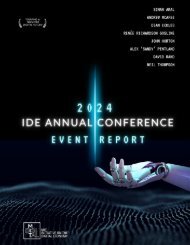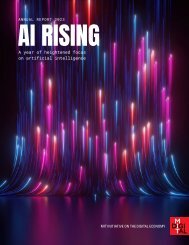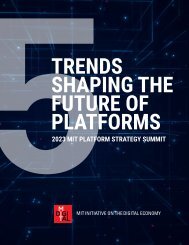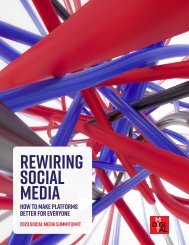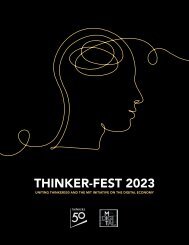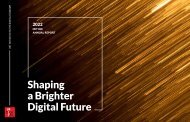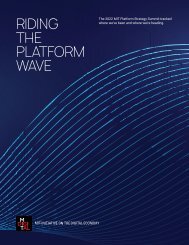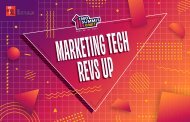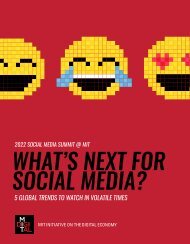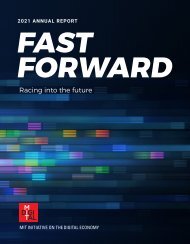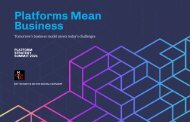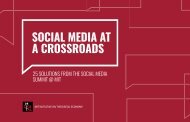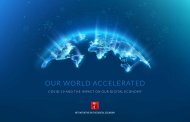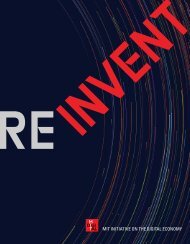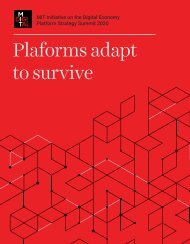MIT2018report-final-digital
Create successful ePaper yourself
Turn your PDF publications into a flip-book with our unique Google optimized e-Paper software.
A<br />
YEAR<br />
OF<br />
IMPACTO<br />
2018 IN REVIEW
M I S S I O N<br />
0 3<br />
In 2018,<br />
we expanded our<br />
global reach and<br />
collaborated with<br />
visionaries who<br />
are making a mark<br />
on the <strong>digital</strong> age—<br />
and the future.<br />
In 2019, we will<br />
redouble our efforts<br />
to examine and solve<br />
the opportunities and<br />
challenges posed by<br />
the <strong>digital</strong> economy.<br />
THE IDE explores how people and businesses<br />
work, interact, and prosper in the <strong>digital</strong> age.<br />
MAKING<br />
GLOBAL<br />
IMPACTO<br />
News headlines from 2018<br />
were rife with warnings of<br />
AI and platform disruption.<br />
The mounting challenges<br />
of globalization, false news,<br />
and the future of work<br />
dominated the narrative.<br />
The MIT Initiative on<br />
the Digital Economy<br />
(IDE) expanded its work<br />
exploring the tremors that<br />
<strong>digital</strong> technologies have<br />
sent throughout the global<br />
economy and society with<br />
its hallmark determination<br />
and focus.<br />
Our research helped<br />
guide leading businesses<br />
and policy makers, and<br />
our Inclusive Innovation<br />
Challenge (IIC) accelerated<br />
and promoted the future<br />
of work entrepreneurial<br />
ecosystem across the globe.<br />
ABOUT THE IDE<br />
Digital technologies are driving<br />
unprecedented change, disruption,<br />
and opportunity in business, the<br />
economy, and society. As the pace<br />
of change accelerates, it’s imperative<br />
that humans examine the most<br />
pressing question of our time: How<br />
do we thrive in a period of profound<br />
<strong>digital</strong> transformation?<br />
The mission of the IDE is rooted<br />
in insight and action. We believe<br />
there is remarkable opportunity for<br />
humans to thrive and prosper in the<br />
<strong>digital</strong> age. While our research is<br />
rigorously academic in its approach,<br />
our charter is to understand, inform,<br />
and pragmatically solve real-world<br />
challenges based on facts and<br />
causality. We are unique among<br />
academic initiatives—applying our<br />
insights to drive improved business<br />
outcomes, economic policy, and<br />
social change.<br />
Led by co-directors Erik Brynjolfsson<br />
and Andrew McAfee, and Executive<br />
Director David Verrill, the IDE<br />
represents MIT at its best. We<br />
collaborate closely with colleagues<br />
across the Institute in disciplines<br />
such as economics, engineering,<br />
computer science, and robotics,<br />
offering a unique solution-space<br />
where stakeholders can research<br />
and experiment, discuss and debate,<br />
teach and learn.<br />
We convene stakeholders and<br />
perform cutting-edge research to<br />
support a robust and inclusive<br />
global economy.<br />
The IDE is actively led by director Erik Brynjolfsson (top<br />
photo) and co-director Andrew McAfee.<br />
03 MISSION 04 ACHIEVEMENTS 06 RESEARCH 08 INCLUSIVE INNOVATION CHALLENGE<br />
10 EVENTS 12 EDUCATION 14 WHAT’S AHEAD 16 IDE TEAM 18 SUPPORT LEARN MORE ABOUT OUR MISSION, VISION, AND UPCOMING EVENTS AT IDE.MIT.EDU
A C H I E V E M E N T S 0 5<br />
NOTEWORTHY<br />
IN<br />
2018<br />
Scenes from the Future of Work conference (from top):<br />
Renée Gosline moderates a panel. IDE co-director Andrew<br />
McAfee engages panelists. IDE director Erik Brynjolfsson<br />
interviewed former Alphabet chairman Eric Schmidt.<br />
THE IIC EXPANDS ITS GLOBAL REACH<br />
We expanded our flagship initiative, the MIT<br />
Inclusive Innovation Challenge, with events in five<br />
global regions, culminating with the award of $1<br />
million at the Global Grand Prize Gala at MIT in<br />
November. page 8<br />
Inclusive Innovation Challenge Executive Producer, Devin Cook (far left), joined North America MIT IIC award winners at a celebration in Detroit.<br />
At home or abroad, the IDE<br />
collaborates with experts in<br />
many disciplines to examine<br />
the complexities of the <strong>digital</strong><br />
economy and provide insights<br />
and strategies based on data.<br />
GLOBAL EVENTS MAKE AN IMPACT<br />
The IDE convenes academic and industry-focused events<br />
that bring together the brightest minds and thought<br />
leaders from across disciplines and sectors to exchange<br />
ideas and learn. In 2018, more than 2,000 thought leaders<br />
and industry experts from around the world gathered to<br />
tackle the most pressing challenges of the <strong>digital</strong> era,<br />
including AI and the future of work, and <strong>digital</strong> platform<br />
disruption. We increased the number of events, hosting<br />
gatherings not only at MIT, but on five continents. page 10<br />
PRESS & MEDIA<br />
The IDE again experienced a significant increase in press<br />
coverage, which expanded our global reach and deepened<br />
public understanding of our mission and vision. We<br />
reached stakeholders and external audiences through<br />
more channels than ever before, and optimized our social<br />
media presence.<br />
ON THE RISE: SUPPORT FOR THE IDE<br />
We continued to build and expand relationships<br />
with new and existing Corporate Members. Our<br />
members played prominent roles at our events as<br />
speakers and as vocal participants. We welcomed<br />
Corporate Member Deutsche Bank as our newest<br />
Founding Member, and our Corporate Membership<br />
program grew significantly.<br />
GROUNDBREAKING RESEARCH<br />
This year, our team of world-class researchers<br />
and visiting scientists conducted more than 35<br />
cutting-edge research projects in collaboration with<br />
stakeholders, business, government, and other<br />
institutions. page 6<br />
LEARNING IN ACTION<br />
The IDE managed another successful year of the<br />
Analytics Lab (A-Lab), a project-based course<br />
focused on big data and modern analytics applied<br />
to real world problems using data provided by our<br />
stakeholders. In addition, IDE content was featured<br />
in several MIT Sloan Executive Education courses,<br />
from IoT to Platforms. page 13
R E S E A R C H<br />
0 7<br />
EXPLORATION +<br />
ILLUMINATION<br />
In 2018, the IDE initiated, continued, or completed 35 research projects.<br />
Here’s a look at five from the past year.<br />
What Can Machines<br />
Learn and What Does it<br />
Mean for Occupations<br />
and the Economy?<br />
Erik Brynjolfsson<br />
Daniel Rock<br />
Tom Mitchell<br />
Concern about automation’s impact<br />
on employment is growing. Rapid<br />
advances in machine learning<br />
(ML), many based on deep neural<br />
networks, are poised to generate<br />
significant economic value and<br />
transform numerous occupations<br />
and industries. Our research<br />
suggests that ML technologies<br />
will indeed grow more pervasive,<br />
but not uniformly. What we define<br />
as the “suitability for machine<br />
learning” (SML) of work tasks varies<br />
greatly. The team used data from<br />
the Bureau of Labor Statistics to<br />
understand the kind of tasks that<br />
typically make up a job and provided<br />
insight into the risk of automation of<br />
some 900 different professions. Our<br />
23-question SML rubric can be used<br />
in the redefinition of a job or<br />
an occupation. The results indicate<br />
that debates about the effects<br />
of artificial intelligence (AI) on<br />
work should shift from the common<br />
focus on full automation of many<br />
jobs and pervasive occupational<br />
replacement, toward the redesign<br />
of jobs and reengineering of<br />
business processes.<br />
Demographics and<br />
Automation<br />
Daron Acemoglu<br />
Pascual Restrepo<br />
Numerous studies examine the<br />
relationship between human workers and<br />
machines; we narrow the scope and look<br />
at a specific slice of the pie. Our research<br />
documents empirically that aging leads<br />
to greater industrial automation, and<br />
in particular, to more intensive use and<br />
development of robots. Using U.S. data,<br />
we document that robots substitute<br />
mostly for middle-aged workers--those<br />
between the ages of 36 and 55. We then<br />
show that demographic change—an<br />
increasing ratio of older to middle-aged<br />
workers—is associated with greater<br />
adoption of robots and other automation<br />
technologies. The data provides evidence<br />
of more rapid technological automation in<br />
countries undergoing greater demographic<br />
change. The model further predicts that<br />
the induced adoption of automation<br />
technology should be more pronounced<br />
in industries that rely on middle-aged<br />
workers and those that present greater<br />
opportunities for automation. Our model<br />
also implies that productivity will increase<br />
and labor share will decline in industries<br />
that are most amenable to automation.<br />
The research can help guide and explain<br />
workforce trends as more automation<br />
technologies are adopted.<br />
Our research suggests that ML technologies will<br />
indeed grow more pervasive, but not uniformly.<br />
MIT IDE’s Sinan Aral at the IDE Annual Conference. His research on false news with co-authors Roy and Vosoughi was named the second most<br />
mentioned scholarly article of 2018 by the Altmetric Top 100.<br />
The Truth About False News<br />
Sinan Aral<br />
Deb Roy<br />
Soroush Vosoughi<br />
The spread of falsity has implications for our democracies, our economies, our<br />
businesses, and even our national security. Professor Sinan Aral of the MIT IDE revealed<br />
the truth about false news based on the largest-ever longitudinal study of the spread of<br />
false news online, published in Science on March 8, 2018. The research, conducted with<br />
Soroush Vosoughi and Deb Roy of the MIT Media Lab, studied "The Spread of True and<br />
False News Online." It investigated the differential diffusion of all the verified, true and false<br />
news stories distributed on Twitter from 2006 to 2017. The data comprise approximately<br />
126,000 stories tweeted by about 3 million people over 4.5 million times. Until this study,<br />
few large-scale empirical investigations of the diffusion of false news or its social origins<br />
had existed. The findings overturn conventional wisdom about how misinformation<br />
spreads, what causes it to spread so fast, and who or what is spreading it. The research<br />
was named the second most mentioned scholarly article of 2018 by the Altmetric Top 100.<br />
The Potential of<br />
Cryptocurrencies<br />
Alexander Lipton<br />
Alex "Sandy" Pentland<br />
The researchers contributed to a<br />
cover article for Scientific American<br />
on “The Future of Money.” Their article,<br />
“Breaking the Bank,” discussed how<br />
new financial networks could stop the<br />
concentration of wealth and increase<br />
participation in the economy--but only<br />
if used with care. A key finding was<br />
that new technologies, such as <strong>digital</strong><br />
currencies, are making it possible to<br />
simulate every trade and transaction.<br />
People could exchange directly with<br />
one another instead of relying on<br />
banks. Additionally, the potential for<br />
sweeping change is real, but there<br />
are many uncertainties. The changes<br />
could just as easily lead to extreme<br />
levels of centralized control.<br />
Toward Zero UI<br />
Renée Gosline<br />
VIEW MORE RESEARCH PROJECTS AT IDE.MIT.EDU<br />
Technology is moving toward “Zero UI,” the<br />
ultimate, invisible user interface that allows<br />
technology to collect data and anticipate<br />
needs without direct requests or user<br />
activity. We focus on the circumstances—<br />
why and how--these technology-mediated<br />
experiences lead to better behaviors. The<br />
goal of the study is better understanding of<br />
the factors that affect customer adoption<br />
and abdication of control to benevolent<br />
technology. To this end, this first study<br />
examines what combination of active and<br />
passive interface makes customers more<br />
(or less) comfortable with technologymediated<br />
management. We have designed<br />
a field experiment that tests the impact of<br />
passive versus active technology, and how<br />
best to present information to users.
I N C L U S I V E I N N O V A T I O N C H A L L E N G E 0 9<br />
ACCELERATING<br />
THE FUTURE OF WORK<br />
around the world<br />
The MIT Inclusive Innovation Challenge (IIC) is the flagship initiative of the IDE.<br />
Since its inception in 2015, the IIC has strengthened the outlook for the Future of<br />
Work around the world.<br />
“The grand challenge of our era is to use <strong>digital</strong> technologies to<br />
create not only prosperity, but shared prosperity. We created<br />
the MIT Inclusive Innovation Challenge to reward and promote<br />
the many amazing people and organizations that are working<br />
to accomplish this mission.”<br />
Erik Brynjolfsson<br />
Director, MIT Initiative on the Digital Economy<br />
Each spring, the IDE opens our<br />
proprietary application and judging<br />
platform to entrepreneurs across the<br />
globe, seeking the most innovative<br />
future of work solutions operating in<br />
each region. We convene thousands<br />
of innovation ecosystem leaders<br />
at regional events and award $1.6<br />
million in prizes yearly to Inclusive<br />
Innovators—entrepreneurs who<br />
are using technology to generate<br />
economic opportunity and shared<br />
prosperity–the grand challenge of the<br />
<strong>digital</strong> era.<br />
2018 MIt INCLUSIVE INNOVATION CHALLENGE WINNERS<br />
INCOME GROWTH +<br />
JOB CREATION<br />
TECHNOLOGY ACCESS<br />
SKILLS DEVELOPMENT +<br />
OPPORTUNITY MATCHING<br />
FINANCIAL INCLUSION<br />
$3.5M 100 100+ 3,000+<br />
AWARDED WINNERS OUTREACH<br />
PARTNERS<br />
500+ 100+ 4,000+<br />
JUDGES<br />
NATIONS<br />
REPRESENTED<br />
REGISTERED<br />
ORGANIZATIONS<br />
EVENT<br />
ATTENDEES<br />
A Global Tournament<br />
In 2018, the IIC expanded to a global<br />
tournament model, working with<br />
collaborators in five regions—North<br />
America, Latin America, Europe,<br />
Africa, and Asia—to identify 60<br />
Regional Finalists. Twenty Regional<br />
Winners proceeded to MIT in<br />
November where we awarded $1<br />
million to four Global Grand Prize<br />
Winners.<br />
The IIC Winners are exemplary<br />
Inclusive Innovators, representing<br />
organizations from every corner<br />
of the globe that are harnessing<br />
technology to create increased work<br />
opportunities and more widely shared<br />
prosperity for people at the bottom<br />
and middle of the economic pyramid.<br />
Whether they are providing easier<br />
access to financial loans, offering<br />
coding classes or college-entry<br />
support, or skilling and matching<br />
workers to new work opportunities<br />
created in the Second Machine Age,<br />
the winning global entrepreneurs<br />
earned their awards by using<br />
technology to engage thousands<br />
more people in the <strong>digital</strong> economy.<br />
GRAND PRIZE WINNER<br />
Wefarm AFRICA<br />
Wefarm is a free, peer-to-peer<br />
knowledge sharing network<br />
for the world’s 500 million<br />
small-scale farmers who have<br />
no access to the internet. To<br />
date, 1.2 million farmers have<br />
registered on Wefarm, and have<br />
exchanged more than 190 million<br />
SMS messages.<br />
WINNERS<br />
Apli LATIN AMERICA<br />
Plastics for Change ASIA<br />
mecasa EUROPE<br />
AnnieCannons NORTH AMERICA<br />
GRAND PRIZE WINNER<br />
Solar Freeze AFRICA<br />
Nearly 45% of farm-grown food<br />
in developing countries spoils<br />
due to lack of cold storage.<br />
Solar Freeze is a portable,<br />
off-grid toolkit for localized<br />
food production containing a<br />
complete ecosystem of smart<br />
farm technologies to enhance<br />
agricultural productivity.<br />
WINNERS<br />
Levee LATIN AMERICA<br />
SOLshare ASIA<br />
Apps Without Code NORTH AMERICA<br />
BLITAB EUROPE<br />
GRAND PRIZE WINNER<br />
CareAcademy NORTH AMERICA<br />
CareAcademy provides online<br />
education to caregivers,<br />
teaching them how to provide<br />
excellent care for older adults<br />
and people with disabilities.<br />
Caregivers can better serve<br />
their clients while advancing<br />
their careers and improving<br />
their own quality of life.<br />
WINNERS<br />
Micro:bit EUROPE<br />
Lynk AFRICA<br />
iMerit ASIA<br />
Sumá LATIN AMERICA<br />
GRAND PRIZE WINNER<br />
ftcash ASIA<br />
ftcash is a fast-growing fintech<br />
venture empowering Indian smallbusinesses<br />
and micro-merchants<br />
through loans and <strong>digital</strong><br />
payments. ftcash also provides<br />
loans to underserved small<br />
merchants based on the analysis<br />
of their creditworthiness using its<br />
proprietary algorithms.<br />
WINNERS<br />
Fig Tech NORTH AMERICA<br />
Wala AFRICA<br />
Trezeo EUROPE<br />
RedeDots LATIN AMERICA<br />
APPLY FOR THE 2019 IIC CHALLENGE + VIEW PAST IIC WINNERS AT<br />
MITINCLUSIVEINNOVATION.cOM<br />
GLOBAL REGIONAL APPLICATIONS OPEN MARCH 2019
E V E N T S 1 1<br />
GAME-CHANGING EVENTS<br />
ACROSS THE GLOBE<br />
Students, executives, policymakers, and entrepreneurs hacked, learned, and challenged<br />
one another throughout the year and around the world.<br />
Geoffrey Parker, MIT IDE Digital Fellow and Platform Strategy Summit Co-Chair, with panelists (from left): Thomas Friese, VP for Digital Ecosystem<br />
Platform at Siemens Healthcare, Alice Raia, VP Digital Presence, Kaiser Permanente, and Valérie Abrell Duong, VP IT Sanofi.<br />
Platform Strategy Summit<br />
July 13, 2018<br />
Cambridge, MA<br />
The IDE hosted the fifth annual workshop on platformcentered<br />
economics and management. We assembled a<br />
global community of executives to explore the economics<br />
and management of platform-centered markets and discuss<br />
their implications for managers, industry, and governmental<br />
policy. The IDE published a report of the valuable insights<br />
offered at the Summit, available at ide.mit.edu.<br />
2018<br />
PLATFORM<br />
STRATEGY<br />
SUMMIT<br />
DOWNLOAD THE 2018 PLATFORM<br />
STRATEGY SUMMIT REPORT AT<br />
IDE.MIT.EDU<br />
Hacking Our<br />
Digital Future<br />
January-February 2018<br />
Cambridge, MA<br />
In this four-week long “hackathon”<br />
during MIT’s Independent Activities<br />
Period, we invited members of<br />
the MIT community to develop<br />
scenarios in an exploration of<br />
the unforeseen consequences<br />
of major technology-driven<br />
transformations in the <strong>digital</strong> age.<br />
The Future of Work:<br />
Capital Markets,<br />
Digital Assets, and<br />
the Disruption of Labor<br />
April 27, 2018<br />
New York, NY<br />
Leaders from industry, academia,<br />
and public policy joined us in<br />
New York City to discuss, debate<br />
and envision the future of capital<br />
markets, <strong>digital</strong> assets and the<br />
disruption of jobs, industries, and<br />
business models.<br />
MIT Sloan CIO Symposium<br />
May 23, 2018<br />
Cambridge, MA<br />
Hundreds of thought leaders and<br />
practitioners gathered to provide<br />
insight into the most critical issues<br />
and opportunities around the<br />
digitization of business.<br />
IDE Annual Conference<br />
May 24, 2018<br />
Cambridge, MA<br />
The IDE Annual Conference is<br />
a unique opportunity for our<br />
stakeholders to hear our latest<br />
research results, discuss areas<br />
of focus going forward, and<br />
engage in dialogue with our<br />
researchers and each other.<br />
Our annual “drink from the<br />
firehose” event offered brief,<br />
TED-style presentations of our<br />
current research projects.<br />
STAY INFORMED ABOUT EVENTS!<br />
SIGN UP AT IDE.MIT.EDU<br />
Conference on Digital<br />
Experimentation (CODE)<br />
October 26-27, 2018<br />
Cambridge, MA<br />
This two-day Conference on Digital<br />
Experimentation (CODE) brought<br />
together leading researchers conducting<br />
and analyzing large-scale, randomized<br />
experiments in <strong>digital</strong>ly mediated<br />
social and economic environments.<br />
Organized by the IDE’s Sinan Aral, Erik<br />
Brynjolfsson, Alex “Sandy” Pentland,<br />
and Dean Eckles, MIT Sloan Assistant<br />
Professor, the event attracted more than<br />
200 attendees from several scientific<br />
disciplines—including economics,<br />
computer science, and sociology—to gain<br />
better insights into human behavior. CODE<br />
hosted over 60 presentations, including a<br />
Fireside Panel on algorithms, transparency,<br />
and accountability.<br />
MIT IIC Regional Celebrations<br />
August - September 2018<br />
This year, the MIT IIC hosted celebrations<br />
in five geographical regions, awarding<br />
prizes, celebrating inclusive innovators, and<br />
accelerating the global future of<br />
work ecosystem The events were held in:<br />
São Paulo, Brazil; Bangkok, Thailand; Nairobi,<br />
Kenya; Darmstadt, Germany,<br />
and Detroit, Michigan.<br />
MIT IIC Global Grand Prize Gala<br />
November 8, 2018<br />
Cambridge, MA<br />
At this invitation-only, capstone event, we<br />
celebrated the 2018 IIC Regional Winners —<br />
organizations from around the world that are<br />
accelerating economic inclusion and shared<br />
prosperity in the <strong>digital</strong> age — and awarded<br />
a total of $1 million to four Global Grand<br />
Prize Winners. The Gala, attended by regional<br />
experts, prominent members of academia,<br />
leading entrepreneurs and business leaders,<br />
funders, and media, was the culmination of<br />
a year-long search for organizations that are<br />
reinventing the future of work today.<br />
EU Platform Economy Conference<br />
November 20-21<br />
Berlin, Germany<br />
It was an honor for the MIT IDE to support<br />
this two-day event focused on the platform<br />
economy in Europe. IDE Director Erik<br />
Brynjolfsson delivered the keynote address,<br />
and IDE Digital Fellow Geoffrey Parker<br />
moderated a panel discussion.<br />
MIT AI & The Future of Work<br />
Congress<br />
November 8, 2018<br />
Cambridge, MA<br />
The IDE and the Computer Science and<br />
Artificial Intelligence Lab (CSAIL) hosted<br />
their highly anticipated second annual<br />
conference, bringing together thought<br />
leaders from academia and business,<br />
economists, and visionaries for an open<br />
dialogue about technology and its impact<br />
on work.<br />
IDE Seminar Series<br />
March – May 2018<br />
September – December 2018<br />
Cambridge, MA<br />
Our informal seminars include provocative<br />
ideas and early results from current<br />
research projects and. Speakers included:<br />
Glen Weyl<br />
Microsoft Research, Yale University<br />
Tyler Cowen<br />
George Mason University<br />
Jared Cohen<br />
Jigsaw<br />
Timnit Gebru<br />
Microsoft Research<br />
Caroline Paunov<br />
OECD<br />
Cory Doctorow<br />
craphound.com<br />
Hal Varian<br />
Google<br />
Andrew Lo<br />
MIT<br />
Pascual Restrepo<br />
MIT, Boston University<br />
Morgan Frank<br />
MIT Media Lab<br />
Daniel Rock<br />
MIT Initiative on the Digital Economy<br />
Nicholas Economides<br />
NYU<br />
Christos Makridis<br />
Council of Economic Advisers<br />
Sunny Feng Han<br />
Co-Founder, Elastos<br />
Yannis Bakos<br />
NYU<br />
Iván Werning<br />
MIT<br />
Select seminars available<br />
at ide.mit.edu
E D U C A T I O N 1 3<br />
5 years of<br />
action learning<br />
Student teams use analytics to deliver solutions to real-world business challenges.<br />
Student teams in the MIT Analytics Lab<br />
(A-Lab) select and deliver projects using<br />
analytics, machine learning, and other<br />
methods of analysis to develop results that<br />
diagnose, enable, or uncover solutions to<br />
real business issues and opportunities.<br />
Organizations from around the world,<br />
including Corporate Members of the IDE,<br />
provide their data, time, and insights at the<br />
start of the semester to enable student<br />
teams to develop actionable solutions and<br />
impactful findings that provide value far<br />
beyond the fall semester.<br />
The A-lab Schneider Electric Team presents at the 2018 <strong>final</strong>s. From L-R: Rajlakshmi De,<br />
Zhechao Huang, Pierre Jockers, and Jixin Wang.<br />
DIGITALLY DELIVERED<br />
EXECUTIVE EDUCATION<br />
Our educational programs are equipping a new generation of principled<br />
leaders who recognize the power of technology, but respect the human<br />
importance of “work.” IDE faculty and researchers taught a number of<br />
executive education courses during 2018 including:<br />
• Artificial Intelligence: Implications for Business Strategy<br />
• Blockchain Technologies: Business Innovation and Applications<br />
• Digital Business Strategy: Harnessing Our Digital Future<br />
• Digital Marketing and Social Media Analytics<br />
• Internet of Things: Business Implications and Opportunities<br />
Projects this fall ranged from areas as<br />
diverse as predicting the future of jobs<br />
based on ad postings, optimizing the<br />
efficiency of matching in a two-sided<br />
marketplace, segmenting and classifying<br />
brick and mortar store visitors using<br />
wifi data, building a chatbot to assist<br />
sales managers responsible for product<br />
configuration, and predicting the risk of<br />
default using consumer transaction data.<br />
The winning team, determined by a live<br />
panel of “celebrity judges,” worked with a<br />
leading paint manufacturer in Latin America<br />
to determine the effectiveness of their<br />
marketing strategy. To do this, the students<br />
built a ready-to-use, customizable, image<br />
recognition tool to measure in-store brand<br />
presence. The tool will inform how the<br />
company can better allocate its marketing<br />
budget and allow decision makers to<br />
further explore the effect of visual presence<br />
on B2B and B2C sales, product presence,<br />
and pricing.<br />
2018 Analytics Lab Winning Team Qroma (Team: Nader Hoballah, An Luong, Antoine Roncoroni, Alexandre Saillard. Mentor: Naghmeh Momeni)<br />
are pictured with MIT IDE’s Susan Young and Sinan Aral, and judges Tod Loofbourrow, Yael Avidan, Renée Gosline, and Michael Schrage.<br />
PROJECT SPONSORS<br />
Accenture and Morningstar • Avianca • BASF • Burning Glass Technologies<br />
C6 Bank • Citi • College Pulse • Falabella • GE Transportation • Havas<br />
Intursa • JPMorgan Chase • Lineage Logistics • LittleHoots<br />
Nomura Research Institute • Qroma • Schneider Electric • TASA<br />
TripAdvisor • Urbanova • Voices.com<br />
A leading paint manufacturer in Latin America now has an<br />
image-recognition tool to help it better allocate its marketing<br />
budget—thanks to this year’s winning A-Lab team.<br />
300<br />
students<br />
90<br />
projects<br />
12+<br />
departments
W H A T ’ S A H E A D 1 5<br />
A LOOK AHEAD: 2019<br />
Automation, <strong>digital</strong><br />
platforms, and innovations<br />
in AI and machine<br />
learning are changing<br />
the fundamental nature<br />
of work—and more rapid<br />
change is ahead.<br />
The IDE will continue<br />
mapping the landscape<br />
for the future of work,<br />
helping business leaders,<br />
policy makers, and<br />
workers understand these<br />
shifts and move forward.<br />
Want to be part<br />
of the IDE action<br />
in 2019? Sign up<br />
for the IDE<br />
newsletter at<br />
ide.mit.edu.<br />
SUITABILITY FOR MACHINE LEARNING (PART 2)<br />
New machine learning techniques and automation are<br />
transforming the American workforce. In previous research,<br />
we evaluated every job task in the O*NET database for its<br />
“suitability for machine learning” (SML), offering a theoretical<br />
framework for how occupations will change and predicting<br />
which specific occupations are most exposed to advances<br />
in machine learning methods. In 2019, we will apply the<br />
rubric to ten primary sectors of the economy, and to five<br />
corporations. Not only will this approach provide a broad<br />
and deep picture of how machine learning is affecting the<br />
workforce, but this input will inform a new, multi-stakeholder<br />
approach for the modern global enterprise and contribute<br />
to a public-policy manifesto. Our overarching goal is to help<br />
workers achieve and maintain meaningful employment.<br />
MIT INCLUSIVE INNOVATION CHALLENGE 2019<br />
In 2019, the IIC will again collaborate with organizations<br />
in five regions around the world to further expand the<br />
IIC’s impact on the Future of Work and the entrepreneurs<br />
who are reinventing it, deriving even more diverse and<br />
valuable insights for would-be Inclusive Innovators. Sixty<br />
Regional Finalists, selected by in-region experts, will pitch<br />
their solutions at regional celebrations. There, 20 Regional<br />
Winners will be selected to proceed to the 4th Annual<br />
MIT IIC Global Grand Prize Gala where $1 million will be<br />
awarded to four Global Grand Prize Winners.<br />
MORE FEATURED EVENTS<br />
MIT IDE events will focus on new topics in 2019 including<br />
policy-making around AI and how to engage law-makers.<br />
We also have plans to host more events in different<br />
parts of the world in order to engage a broader group of<br />
stakeholders. Sign up for the IDE newsletter at ide.mit.edu<br />
to stay informed on upcoming news and events.<br />
View the MIT IDE Future of Work report at ide.mit.edu.
I D E T E A M 1 7<br />
THE PEOPLE<br />
BEHIND THE IDE<br />
RESEARCH<br />
PILLAR<br />
LEADS<br />
RESEARCHerS<br />
Erik Brynjolfsson<br />
@erikbryn<br />
Director, MIT IDE<br />
Professor, MIT Sloan School of Management<br />
Alex “Sandy” Pentland<br />
@alex_pentland<br />
Professor, MIT Media Lab<br />
* New additions to the IDE team are denoted by a red dot.<br />
Andrew McAfee<br />
@amcafee<br />
Co-Director, MIT IDE<br />
Principal Research Scientist<br />
Sinan Aral<br />
@sinanarl<br />
Professor, MIT Sloan School of Management<br />
DIGITAL<br />
FELLOWS<br />
Ph.D<br />
CANDIDATES<br />
AND<br />
POST-<br />
DOCTORAL<br />
FELLOWS<br />
Tim Aeppel Reporter, Reuters<br />
Yannis Bakos Research Affiliate, Associate Professor at Stern School of Business, NYU<br />
Sagit Bar-Gill Assistant Professor, Tel Aviv University’s Coller School of Management<br />
Thomas Davenport Professor, Babson College<br />
Alan Davidson Digital Economy Director, U.S. Department of Commerce<br />
Andrey Fradkin Boston University, Assistant Professor of Marketing<br />
Joshua Gans Professor, University of Toronto Rotman School of Management<br />
Shane Greenstein Professor, Harvard Business School<br />
Lorin Hitt Professor, University of Pennsylvania Wharton School<br />
Yu Jeffrey Hu Professor, Georgia Institute of Technology<br />
Xiang Hui Assistant Professor of Marketing, Washington University in St. Louis<br />
Meng Liu Visiting Assistant Professor of Marketing, Washington University in St. Louis<br />
Tod Loofbourrow CEO, ViralGains<br />
Kristina McElheran Assistant Professor, University of Toronto<br />
Christos Nicolaides Lecturer, University of Cyprus<br />
Geoffrey Parker Professor, Dartmouth College<br />
Claudia Perlich Chief Scientist, Dstillery<br />
Jonathan Ruane MIT Sloan Lecturer *<br />
Michael Schrage Visiting Fellow, Imperial College Department of Innovation and Entrepreneurship<br />
Sonny Tambe Associate Professor, NYU Stern School of Business<br />
Irving Wladawsky-Berger Professor, MIT Engineering Systems<br />
Lynn Wu Assistant Professor, University of Pennsylvania<br />
Erina Ytsma Carnegie Mellon University, Assistant Professor of Accounting<br />
Seth Benzell<br />
Avinash Collis<br />
Paramveer Dhillon<br />
Shan Huang<br />
Wenjing “Rebecca” Lyu<br />
Zanele Munyikwa<br />
Christina Patterson<br />
Daniel Rock<br />
Guillaume Saint-Jacques<br />
Daniela Scur<br />
Ananya Sen<br />
Aya Suchi<br />
Xiupeng “Jeff” Wang<br />
Zhen “Jeremy” Yang<br />
Glen Urban Professor, MIT Sloan School of Management<br />
George Westerman Principal Research Scientist, ODL<br />
Renée Gosline Professor, MIT Sloan School of Management<br />
Michael Siegel Principal Research Scientist, MIT Sloan School of Management<br />
Roberto Rigobon Professor, MIT Sloan School of Management<br />
David Autor Professor, MIT Economics Department<br />
Catherine Tucker Professor, MIT Sloan School of Management<br />
Scott Stern Professor, MIT Sloan School of Management<br />
Neil Thompson Research Scientist, MIT CSAIL<br />
Wang Jin Research Associate, IDE<br />
Dean Eckles Assistant Professor, MIT Sloan School of Management<br />
Christian Catalini Assistant Professor, MIT Sloan School of Management<br />
John Van Reenen Professor, MIT Sloan School of Management<br />
Daron Acemoglu Professor, MIT Economics Department<br />
Mohammad Jalali Research Scientist, MIT Sloan School of Management<br />
VISITING<br />
SCIENTISTS<br />
IDE STAFF<br />
Tetsuhiro Amma Suruga Bank<br />
Inès Yun Ye Capgemini Consulting<br />
David Verrill Executive Director<br />
Christie Ko Associate Director<br />
Susan Young Assistant Director<br />
Tammy Buzzell Financial/Contract Administrator<br />
Joanne Batziotegos Finance Administrator<br />
Devin Cook Executive Producer, Inclusive Innovation Challenge<br />
Shannon Farrelly Director, Communications and Media Relations<br />
Paula Klein Contributing Writer, Editorial Content Manager<br />
Adjovi Koene Program Assistant<br />
Carrie Reynolds Program & Events Coordinator *<br />
Naomi Stephen Executive Assistant to Erik Brynjolfsson *
S U P P O R T 1 9<br />
OUR THANKS<br />
IDE Associate Director Christie Ko encourages supporters to actively participate in our events.<br />
We invite you to connect,<br />
engage, and share ideas with<br />
other visionaries who are<br />
shaping the conversation<br />
about the <strong>digital</strong> economy<br />
and future of work. There are<br />
many ways that individuals<br />
and organizations can support<br />
the IDE to drive meaningful<br />
change and help shape the<br />
future economy. To learn more,<br />
go to ide.mit.edu/support-ide.<br />
ADVISORY BOARD<br />
The IDE Advisory Board is composed of<br />
executives and Nobel Laureates who provide<br />
insights and guidance to the IDE regarding<br />
our research and other activities. They also<br />
co-host and speak at our events.<br />
Mitchell Baker *<br />
Chairwoman and Co-Founder, Mozilla<br />
Carl Bass<br />
Former President and CEO, Autodesk<br />
Marc Benioff<br />
CEO, Salesforce<br />
Mary Callahan Erdoes *<br />
CEO of Asset and Wealth Management,<br />
J.P. Morgan<br />
Reid Hoffman<br />
CEO, Linkedin<br />
James Manyika<br />
Director, McKinsey Global Institute<br />
Marissa Mayer *<br />
Co-Founder, Lumi Labs<br />
Eric Schmidt<br />
Technical Advisor, Alphabet<br />
Robert Solow<br />
MIT Professor of Economics and Nobel Laureate<br />
Michael Spence<br />
NYU Professor of Economics and Nobel Laureate<br />
SUPPORT<br />
We extend our appreciation to<br />
the extremely generous support<br />
of individuals, foundations, and<br />
corporations who make what we<br />
do possible.<br />
FOUNDATIONS<br />
Ford Foundation<br />
Google.org<br />
Joyce Foundation<br />
NASDAQ Foundation<br />
Rockefeller Foundation<br />
Ralph J. Wilson Foundation<br />
TDF Foundation<br />
Walmart Foundation *<br />
GIFTS<br />
Joseph Eastin<br />
Steven A. Denning<br />
Eric and Wendy Schmidt<br />
Joël Andre Ornstein<br />
Bruce and Ellen Herzfelder<br />
Gustavo Pierini<br />
Gustavo Marini<br />
Jeff & Leisl Wilke<br />
—and other individuals who<br />
prefer to remain anonymous.<br />
* indicates new member or supporter<br />
CORPORATIONS<br />
Accenture (Founding)<br />
Deutsche Bank (Founding)<br />
3M<br />
AI in Gov *<br />
Amazon.com<br />
BenefitFocus *<br />
BASF *<br />
Boston Globe<br />
Capgemini Consulting<br />
Dell EMC<br />
Deloitte Digital<br />
EMD Serono<br />
Futurewei<br />
Gradus Management *<br />
IBM Watson *<br />
ING Group<br />
IRC4HR<br />
ISN<br />
MassMutual<br />
Merck & Co.<br />
Microsoft<br />
Nomura Research Institute<br />
Northwestern Mutual<br />
Philips Lighting<br />
Prudential Financial<br />
SAS<br />
Schindler Group<br />
Schneider Electric<br />
Suruga Bank<br />
TDF Ventures<br />
WeChat<br />
Photography<br />
Andrew Kubica<br />
Valencia Images<br />
Cooler heads are prevailing.<br />
The constant drumbeat of<br />
“machines taking our jobs”<br />
has thankfully softened, and<br />
the hard work of harnessing<br />
technology for broader and<br />
more equal benefit is gaining<br />
traction.<br />
The IDE is leading the way as<br />
only a global initiative at a place<br />
like MIT can.<br />
Our research is measuring the<br />
real impact of technology—at<br />
the macro level, and at the very<br />
granular level by geography,<br />
sector, and even the firm.<br />
Our events are building bridges<br />
between members of the<br />
ecosystem who are putting<br />
ideology in their back pockets<br />
so that we can move toward<br />
real solutions.<br />
Our educational programs are<br />
equipping a new generation<br />
of principled leaders who<br />
recognize the power of<br />
technology, but respect the<br />
human importance of “work.”<br />
And with the MIT Inclusive<br />
Innovation Challenge, we are<br />
scouring every corner of the<br />
earth to find organizations<br />
that are reinventing the<br />
future of work.<br />
I am so energized by the positive<br />
impact we are making through<br />
our activities at the IDE. We<br />
need more of you with us!<br />
David Verrill<br />
Executive Director<br />
MIT Initiative on the Digital Economy
MIT Sloan School of Management<br />
245 First St, Room E94-1521, Cambridge, MA 02142-1347



